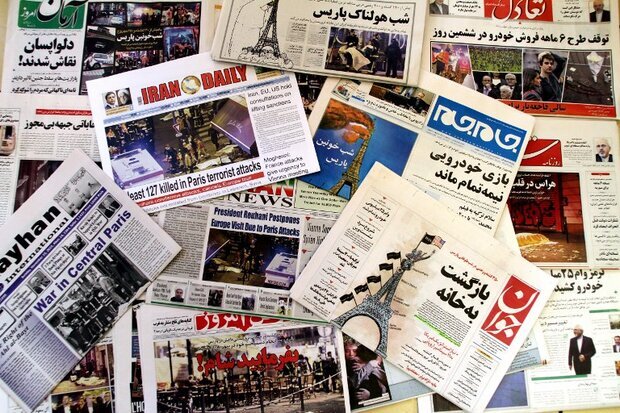Enemy’s psyops intended to be pessimistic about ourselves

In its editorial, the Iran newspaper addressed the statements of the Leader in a meeting with the students. It wrote: The Leader said that the enemy’s goal is to create pessimism towards ourselves. He mentioned:
First. Being pessimistic about ourselves is actually a “psychological activity” that can be done by ourselves, but the enemy has prepared and designed its way. Pessimism causes both the motivation and enthusiastic progress to lose momentum and we surrender in the face of the enemy and compromise. Unfortunately, in recent decades, a mysterious action with an intellectual gesture had taken this line that everything is achieved by adapting to the Western lifestyle and instilled a great pessimism towards ourselves. Pessimism means reaching the conclusion that “we can’t!” It was really a pessimism that in the 1390s (2000s), the country’s economy continuously recorded negative growth and there was no belief in endogenous economy and progress.
Second. What is the duty of students and young elites today? How can we neutralize the enemy’s strategy of pessimism about ourselves?
Undoubtedly, the first step is that our students and young people have a correct analysis of the country’s situation. The point is that the media plans of the enemy should be revealed. The psychological and media activities of the enemy should be seen correctly and not be defeated or captured by them. It is interesting that the Leader of the revolution emphasized in a part of his speech that students should not drown in cyberspace. Unfortunately, many ideas and mental activities are created on the student’s mind in this cyberspace to ultimately make the student pessimistic about the progress of the country and society.
Etemad: The biography of a security figure
In a detailed commentary, Etemad discussed the life and career of Hossein Taib, the former head of the IRGC Intelligence Organization. It wrote: Taib is now different from his personality two decades ago and even a year ago. He provides analyses like his brother Mehdi and his desire to speak has increased. It is not clear whether he intends to enter the official arena of politics with this new policy. Maybe he wants to be top one in the media in order to convert a mysterious security figure into a political figure. Maybe the media is the place to warm up Taib to seek involvement in the country’s political institutions. Whatever it is, this amount of presence in the media cannot be the background to return to security activities.
Sobh-e-No: Regional Peace and the Zionist Crisis
In its editorial, Sobh-e-No analyzes Israel’s anger at the new changes in the region. It wrote: Undoubtedly, the agreement between Iran and Saudi Arabia, mediated by China, clearly and unmistakably changed the balance of power in the region to the detriment of Tel Aviv, and the Zionists are trying to simultaneously use militarism (attacking the Axis of Resistance) and diplomacy to change the balance of power in their own favor. On the other hand, Netanyahu is facing legitimacy crisis in occupied territories, and this has doubled his problems to isolate Tehran in the region. Domestic and foreign equations are going to the detriment of the Zionists every day more than the previous day.
Arman-e-Emrooz: Chinese JCPOA?
In a note, Arman-e-Emrooz discussed China’s possible role to revitalize the JCPOA and Beijing’s view and performance in this matter and wrote: Only the fear of a complete and final collapse of the JCPOA can force China to return Iran to the agreement and dedicate some of its diplomatic resources to mediate between Tehran and Washington. However, while the current situation in China-America relations reduces hope for Beijing’s mediation, there is a chance that Chinese officials to privately share their concerns with the Iranians. The news of the International Atomic Energy Agency delegation’s visit to Tehran following the claim of discovery of uranium particles with 84% purity and the intensification of diplomatic exchanges between Iran and regional actors (including the upcoming visit of the king of Oman, an important mediator during the JCPOA negotiations) shows that something is moving again around the JCPOA, although in an uncertain direction.
Ham Mihan: The Prince’s folly
Ham Mihan commented on Reza Pahlavi’s trip to Israel and stated that Reza Pahlavi’s trip in the current situation is a sign of his immaturity. An expert wrote: Currently, Netanyahu’s position among the Zionists and the world, including his relationship with America is in the worst possible situation. In this situation, Reza Pahlavi went to Israel. In fact, he chose the worst time to travel. The more important thing is that Reza Pahlavi has thought that he can misuse the created space due to some people’s protests for their rights. So he has started a series of meetings. The reason for Pahlavi’s trip to Israel has been depicted as having meetings with water experts. A specialized work that it does not concern him. Reza Pahlavi personally does not have a position in international arena that his visit could have consequences on the agreement between Iran and Saudi Arabia and the position of other countries on Iran.
Leave a Comment